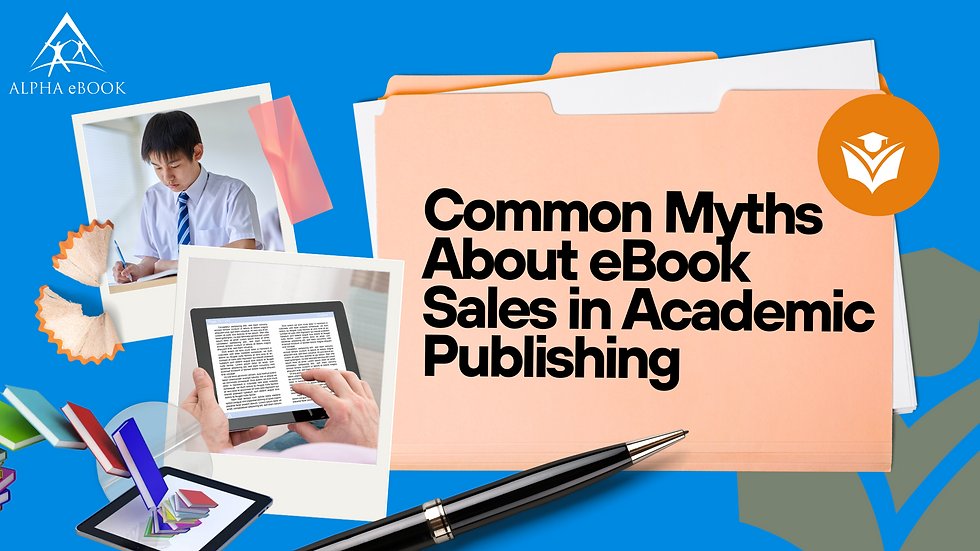Debunking the Myths of eBooks
- Alpha eBook

- Oct 1, 2022
- 3 min read

It seems like everywhere you turn these days, someone is talking about eBooks. This is because EBooks are becoming increasingly popular, whether on the news, in a blog post, or even in conversation. And with this increased popularity comes increased misconceptions. So today, we're going to debunk some of the most common myths about eBooks conversion so you can make an informed decision about whether or not they're right for you.
Debunking the Myths
Myth 1: There Aren't Too Many eBooks Accessible Online
It’s not true. Millions of eBooks are available online, which is growing every day. You can find eBooks about any topic, from cooking to history to self-help. Also, there are millions of free eBooks available. They are available through many websites like Amazon, Google, iTunes, etc. Also, millions of other eBooks are available for purchase on any topic you think of or want.
Myth 2: You Need a Special Electonic Device to Read eBooks
Nope! You can read eBooks on many devices that you already own. If you have a computer, laptop, smartphone, or tablet, you can most likely read eBooks on it. There are many different eBook formats, so make sure your device is compatible with the format you want to read. For example, Kindle eBooks can only be read on devices with the Kindle app installed.
Myth 3: Buying an eBook is Not any Greener than Purchasing a Paper Books
It is another myth that's not true. When you purchase an eBook, you're not using any paper, meaning no trees are being cut down to make your book. Also, no energy is used to print or ship your eBook. And most eBooks are priced lower than their print counterparts, so you save money while being more eco-friendly. If you're done reading a paper book, you must find somewhere to recycle it or donate it. You can keep an eBook stored on your device indefinitely or delete it when you're done reading it.
Myth 4: eBooks Have a Limited Shelf Life
This myth is perpetuated by the fact that technology changes so rapidly. Indeed, an eBook you purchased five years ago might not be compatible with the latest devices and software. But that doesn't mean it has a limited shelf life. You can still read that eBook on an older device or with older software. And even if you can't, there are always new ways to convert old eBooks so they can be read on the latest devices. eBook conversion service will help you with that.
Myth 5: If your Book Isn't of the Required Quality to be Published as a Paper Book, You Can Try To Publish it as an eBook
It isn't the case. You can post your book as an eBook in addition to traditional publication methods. It's not a terrible approach to publish, to be honest. Some publishing companies publish electronically through paper, while others have moved strictly to electronic publication. Many writers are releasing their work as eBooks. It has nothing to do with the author's writing ability. The authors are simply unenthusiastic about publishing paper books and don't want to receive a small cut of the profits from their book sales.
Myth 6: eBooks are a Thing of the Future
Even though eBook publishing is a relatively new industry, it has already generated a significant amount of money in only a short period. Moreover, though eBook sales make up a small percentage of the publishing industry, this gap gradually shrinks as more people read eBooks. So, it can be said that eBooks are the future.
Myth 7: People are Generally Unwilling to Pay Much More than a Few Cents for an eBook
It's not the case. If someone is interested and intrigued by the eBook's subject, they will be ready to pay for it. Because you may sell your eBook online and reach a large number of people for very little money, you can earn a considerably higher income than you would from selling a paper book.
Read here to learn: How to choose the most reliable eBook conversion services.
In Conclusion
ebooks are here to stay and are gradually becoming more popular as people realize their benefits. So if you're thinking of publishing an eBook, don't let these myths stop you. Just be aware that there are some things you need to consider, like eBook format and file compatibility. Contact a professional eBook conversion service for help if you are unsure about anything. They will be able to assist you in getting your eBook ready for publication and distribution. Other than that, go for it!




Comments